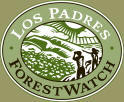|
March 7, 2005 -
FOR IMMEDIATE RELEASE
Contact: LPFW Public Affairs (805) 252-4277
Jeff Miller, CBD (415) 436-9682
FOREST SERVICE WITHDRAWS DECISION TO ALLOW GRAZING
ALONG BIG SUR COAST
Groups Concerned About Impacts to Endangered Species,
Water Quality, and Wilderness Areas
In
response to an appeal filed by conservation groups, the
Forest Service announced today that it would withdraw its
decision authorizing livestock grazing on nearly 33,000 acres
along the Big Sur coastline in the Los Padres National Forest.
As approved, the grazing would have damaged sensitive habitats
for endangered species, polluted clean rivers, and interfered
with newly-designated wilderness areas.
 The
appeal was filed in January by an alliance of local and national
conservation groups, including Los Padres ForestWatch,
Ventana Wilderness Alliance, Center for Biological Diversity,
and the Ventana Chapter of the Sierra Club. At issue in the
appeal was a decision by the Forest Service to authorize
continued livestock grazing on four allotments, dramatically
expand grazing on an existing allotment, and create one new
allotment. The
appeal was filed in January by an alliance of local and national
conservation groups, including Los Padres ForestWatch,
Ventana Wilderness Alliance, Center for Biological Diversity,
and the Ventana Chapter of the Sierra Club. At issue in the
appeal was a decision by the Forest Service to authorize
continued livestock grazing on four allotments, dramatically
expand grazing on an existing allotment, and create one new
allotment.
Cattle
and other livestock grazing on these coastal allotments
threatens several federally-listed species, including the
endangered Smith’s blue butterfly, the threatened South-Central
Coast steelhead, and the threatened California red-legged frog,
and negatively impacts sensitive vernal pool habitats and rare
plant species. The decision also illegally increased grazing
levels in a protected wilderness area, conflicted with
recreation uses, and would have lead to further damage of Native
American sites and areas of cultural significance.
“We
filed the appeal because the agency did not follow laws designed
to protect endangered species, clean water, and wilderness,”
said Jeff Kuyper, Executive Director of Los Padres ForestWatch.
“Hopefully, the Forest Service will recognize that intensive
grazing is not compatible with these important coastal
resources.”
In
December 2004, the Forest Service issued Decision Notices
authorizing continued livestock grazing on the Gorda, Salmon
Creek, Alder Creek, and San Carpoforo allotments, and
authorizing new grazing allotments on the Kozy Kove, Sur Sur,
and Sea Vista Ranches. The agency proposed almost the exact same
grazing scheme in 1999, but withdrew the decision after VWA and
CBD filed an appeal, citing an inadequate review of impacts and
a failure to comply with federal laws.
Conservation groups filed their latest appeal on the basis that
the decision violated the federal Endangered Species Act,
National Environmental Policy Act (NEPA), National Forest
Management Act, Wilderness Act, and Coastal Zone Management Act.
Under NEPA, the Forest Service must prepare an Environmental
Impact Statement before approving any action with significant
environmental effects, such as authorizing livestock grazing in
endangered species habitat and wilderness. However, the Forest
Service only prepared a short, less-rigorous environmental
assessment that failed to explore a reasonable range of
alternatives, including not grazing; failed to consider public
comments; failed to consider cumulative environmental impacts;
inadequately assessed grazing impacts to water quality, soils,
recreation, invasive species, and scenic resources; and ignored
numerous published studies showing significant impacts caused by
grazing.
 Cattle
have previously damaged riparian habitat for steelhead along
Prewitt and Plaskett Creeks in the Gorda Allotment, and cattle
can injure or kill steelhead eggs and young fish by treading
through anadromous fish streams. Where livestock graze in or
near Smith’s Blue Butterfly habitat, trampling kills or stunts
the growth of seacliff buckwheat, the butterfly’s host plant.
Despite repeated requests, the Forest Service refused to survey
for rare vernal pools for sensitive species or for red-legged
frogs in ponds on the allotments, ignored requests to consider
grazing impacts on water quality and habitat in vernal pools,
and failed to adequately consult with the U.S. Fish and Wildlife
Service on impacts to these species, in violation of the ESA. Cattle
have previously damaged riparian habitat for steelhead along
Prewitt and Plaskett Creeks in the Gorda Allotment, and cattle
can injure or kill steelhead eggs and young fish by treading
through anadromous fish streams. Where livestock graze in or
near Smith’s Blue Butterfly habitat, trampling kills or stunts
the growth of seacliff buckwheat, the butterfly’s host plant.
Despite repeated requests, the Forest Service refused to survey
for rare vernal pools for sensitive species or for red-legged
frogs in ponds on the allotments, ignored requests to consider
grazing impacts on water quality and habitat in vernal pools,
and failed to adequately consult with the U.S. Fish and Wildlife
Service on impacts to these species, in violation of the ESA.
The
project area has a high degree of biological significance; it
contains habitat for numerous endangered and other sensitive
species; includes portions of and is adjacent to the
Congressionally-designated Silver Peak Wilderness Area; is
bordered by the recently-designated California Coastal National
Monument; contains San Carpoforo Creek, which was declared an
“area of particularly high ecological significance” in the
Forest Service’s Southern California Mountains and Foothills
Assessment; and is adjacent to Monterey Bay National Marine
Sanctuary.
Los
Padres ForestWatch is a nonprofit 501(c)(3) organization working
to protect and restore the natural and cultural heritage of the
Los Padres National Forest through environmental law, science,
education, and community involvement.
##
|

